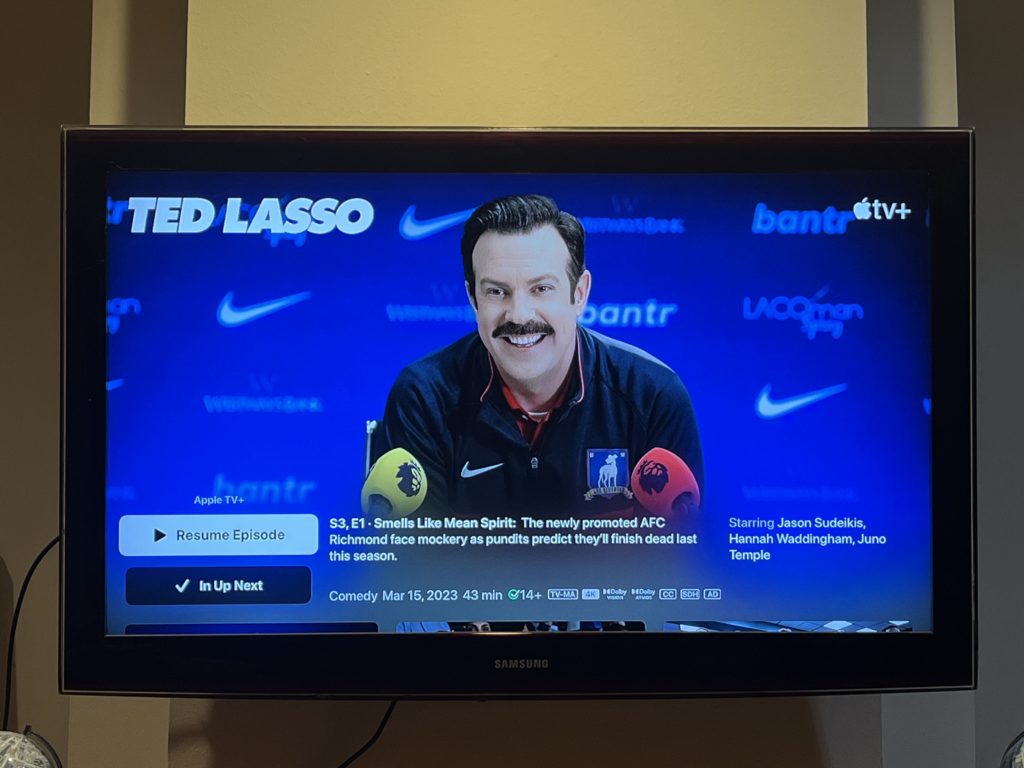When he isn’t sprawled in front of Olivia Wilde’s car in protest of a salad dressing recipe, “Ted Lasso’s” Jason Sudeikis creates a wholesome, witty and downright joyful show, and season three of the series is no exception.
The third, and presumably final, season of the hit comedy is comprised of 12 episodes and kicks off as AFC Richmond — the fictional soccer team the show revolves around — rejoins England’s Premier League after a disheartening relegation in season one. The season, while at times lacking focus, rounds out the stellar series by sticking to what made the it so likable in the first place — highlighting the good within people.
The season premiere came just after record-breaking viewership of the 2022 men’s World Cup, with soccer revived on the American entertainment scene led by “Captain America” Christian Pulisic, followed by a final match where soccer legend Lionel Messi captured his long-sought World Cup trophy and the hearts of viewers around the world. The rise in the sport’s popularity revved up the excitement for more soccer content in the form of the final installment of Ted Lasso, which follows the beloved Ted, an American football coach striving for soccer success in England while grappling with divorce, missing his son and coming to terms with his father’s death.
The show follows the tried-and-true formula of rooting for the triumph of underdogs but separates itself from the pack with its intricate character development. AFC Richmond owner Rebecca Welton learns about finding love after divorce, queerness in sports is explored by several characters and once again, the importance of seeking help for mental health is showcased. The love triangle between fan-favorites coach Roy Kent, star player Jamie Tartt and PR extraordinaire Keeley Jones is a season-long plot line that ends with the men in tatters begging for Keeley’s unreciprocated love as she instead focuses her energy into her public relations firm and the idea for an AFC Richmond Women’s team. An emotionally fulfilling, as opposed to romantic, happily ever after for Keeley.
What makes the show successful is that it doesn’t pretend to be something it’s not. The acting isn’t anything to write home about, nor is the cinematography. The humor is largely millennial-coded, with a fair amount of jokes missing the mark — some of the plays on American and British cultural differences are overused.
But the show’s best asset is that it’s a break. A break from reality, from countless losing seasons by your NFL or NBA team of choice, from TV shows like Succession, where no one gets a happy ending. The show is easy to watch, and the characters are easy to love. The thought of receiving second and third chances, like Coach Nate Shelley receives from Ted after betraying Richmond AFC and joining forces with their rival team, is comforting, and seeing Ted, Roy and others use therapy as a tool to negotiate with loss is inspiring. It’s no small feat, asking for help, especially in the world of sports.
The season reaches its peak content-wise in the final two episodes. The somewhat unrelated subplot lines disappear and focus is paid to the series’ key characters. Heartthrob Jamie Tartt completes his personality 180 — going from a selfish superstar to a team player who -gasp- even passes the ball, as he, Ted and Rebecca each reflect on their childhoods amid encounters with their mothers. The Richmond AFC Greyhounds win a head-to-head matchup against their rival team Manchester City, though their fate in the race to win the Premier League is not entirely in their own hands heading into the final.
The 12th and final episode reveal what has been brewing over the course of the season, Ted has decided to leave the club to reunite with his son in Kansas. The episode goes on to be both a goodbye to Ted and the show. The team performs “So Long, Farewell” from “The Sound of Music” as a tribute to Ted before they best rivals West Ham United, and though the act was admittedly slightly cheesy, the tune struck a heartwarming chord. The group pieces together the tattered and infamous “BELIEVE” sign in one of many full-circle moments that occur over the course of the final episode. Though they ultimately finish second in the league, the personal triumphs of each character outshine the second-place finish.
Some endings feel slightly rushed or even out of nowhere, like Rebecca coincidentally reuniting with her potential soulmate at an airport, a mystery man she met in Amsterdam, and Coach Beard abandoning Ted on the plane to be with his girlfriend Jane. But the majority of the endings, like Colin embracing his boyfriend after the game, Sam finally playing for the Nigerian national team, Trent Crimm’s successful book about the team, Roy Kent’s new role as manager and Jamie reconnecting with his father, all rounded out the show nicely.
“Ted Lasso’s” cross-generational appeal and faith in human nature have drawn fans to the show, and its lighthearted nature and British flair will be missed.








